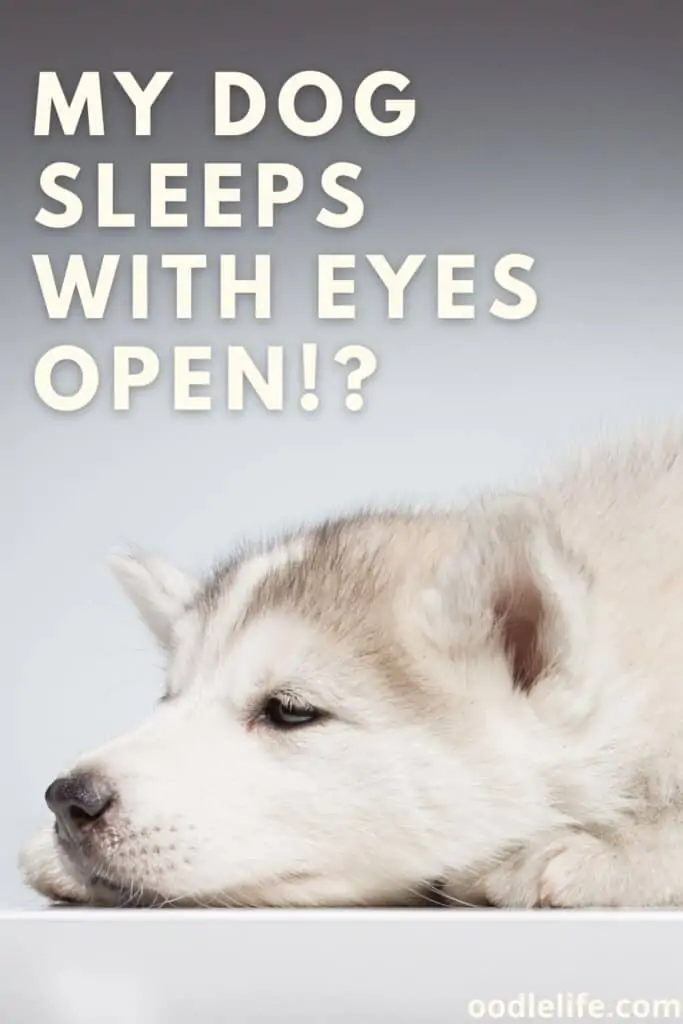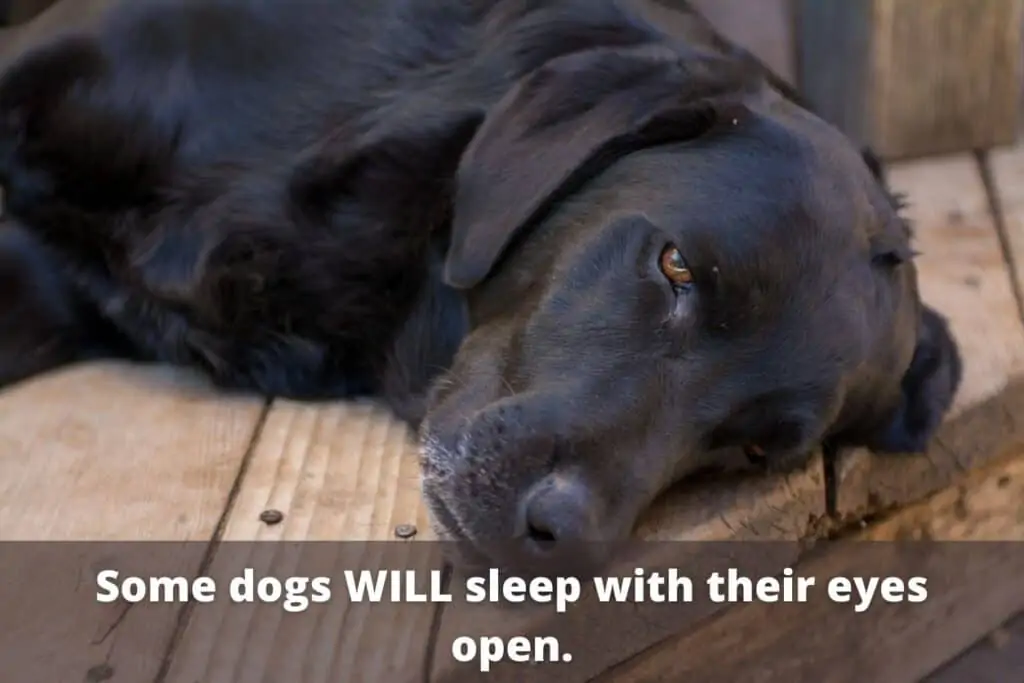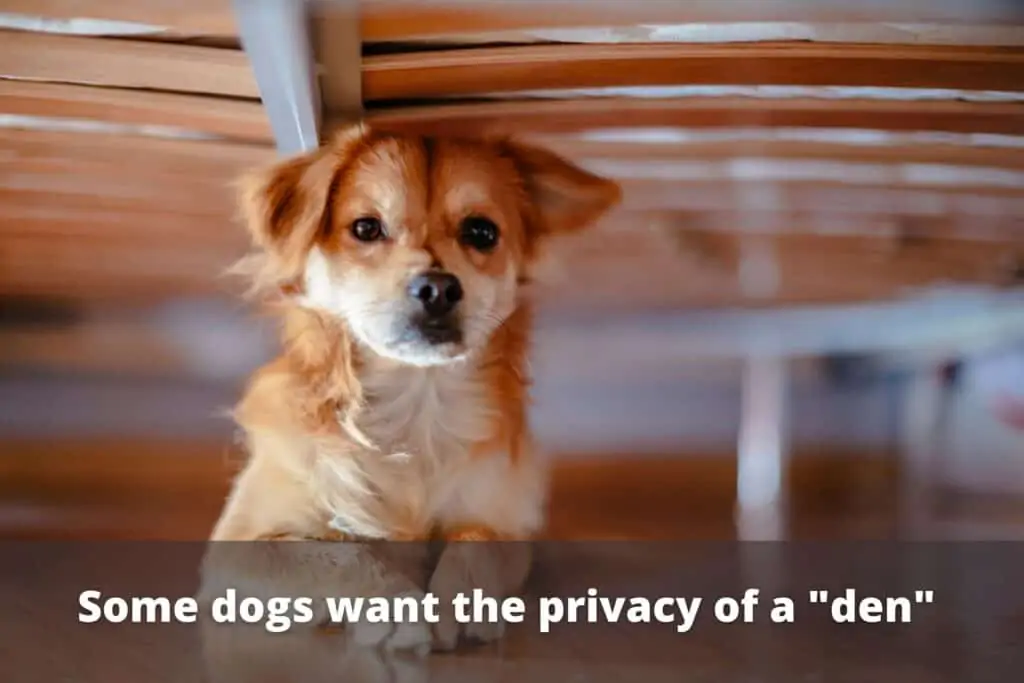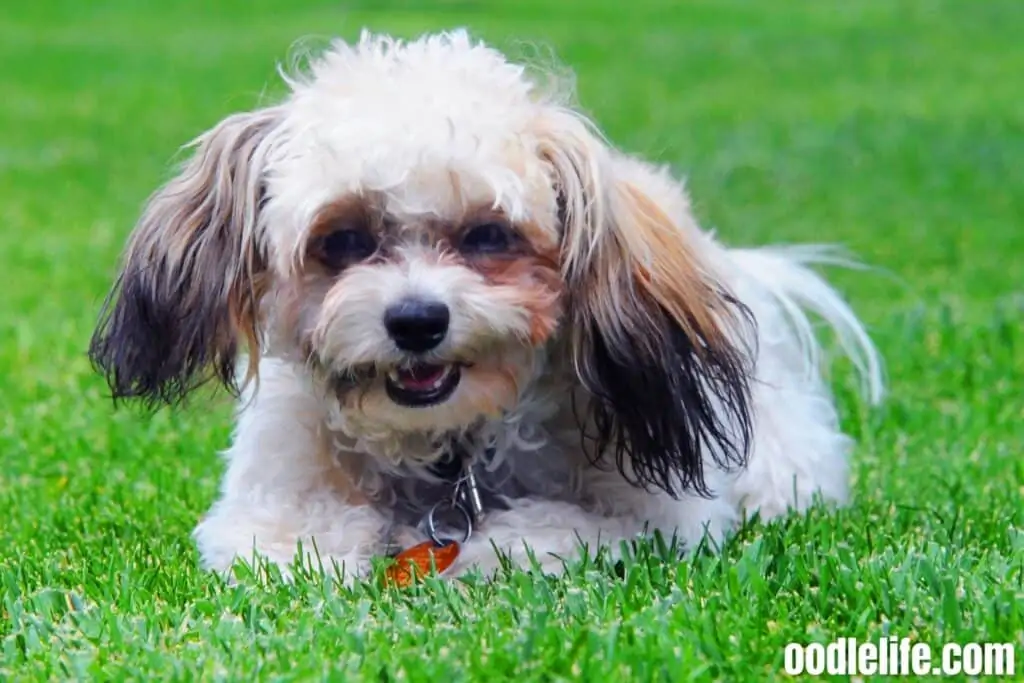My Dog Sleeps With Eyes Open – Is This Normal?
You just put your dog to sleep but noticed his eyes are still open. It isn’t the first time he has slept with his eyes open. Is this normal?

Well, there are lots of reasons why dogs sleep with their eyes open. If the dog just developed the habit, it’s best to visit the vet, but if they’ve been sleeping with their eyes open since birth, no need to worry; it’s normal.
Read on to understand why your dog sleeps with its eyes open.
What is the Normal Sleeping Behavior of a Dog?
Generally, dogs don’t sleep with their eyes open unless they belong to specific breeds or have an underlying medical problem. Understanding a dog’s normal sleeping cycle is the first step in determining if your dog is exhibiting normal sleep patterns.
Typically, dogs have a different sleep cycle from that of humans. While humans’ sleep cycle takes 70 minutes to 120 minutes, dogs have shorter cycles lasting 45 minutes. As such, they’re likely to remain alert even when asleep, sometimes with their eyes open.
In addition, dogs are polyphasic sleepers. This means they sleep multiple times, even during the day, unlike humans, who sleep 7-9 hours at once. So the next time you find your pup lazing in their bed, with their eyes open, it could be one of those few moments between their sleep cycles.
It’s best to encourage them to sleep with their eyes open; forcing them to close their eyes can be harmful or create stress, especially if their bodies can’t do so naturally.

Are Your Dog’s Eyes Open?
You also need to understand that there’s a big difference between a dog’s eyes being wide open and partially closed. If the latter, they may belong to a specific breed or have an underlying health condition.
Short-faced dogs like Pugs, Boston Terriers, bullmastiffs, and others often develop a condition called Lagophthalmos that prevents them from closing their eyes completely. They blink like ordinary dogs to keep debris away, but their eyes remain partially open when asleep.
This condition occurs in dogs whose eyeballs are too big for the eyelids to close. Underlying conditions like glaucoma or genetics can also cause Lagophthalmos. Sometimes your pup may exhibit an eye condition accompanied by watery eyes.
In this case, the dog doesn’t just sleep with their eyes partially open, but it becomes the norm whether they are awake or asleep. This is a tell-tale sign of an eye infection, and it’s best to visit the vet.
Why My Dog Sleeps with Eyes Open
If your dog’s eyes are indeed wide open, it may be caused by one or more of these reasons:
- Natural cause
- Medical reasons
Natural Causes
Some natural occurrences can be genetic or acquired over time:
- Natural Eye Protection
While your dog seems to sleep with their eyes wide open, the truth is they’re ‘closed.’ If the dog slept with their eyes open, they would dry out and develop dry eye syndrome or exposure keratitis. As such, dogs use their third eyelid or nictitating membrane to prevent the eyes from drying out. This membrane makes a dog’s eyes appear wide open while asleep.
The third eyelid facilitates tear production and protects the eyes from debris. And, unlike cats, a dog’s third eyelid is a passive membrane that blinks when the eyes are closed and retracts when open.
If the third eyelid doesn’t retract to its normal position once the dog opens their eyes, it might be a sign of an eye injury, illness, pain, or a damaged nerve, and it’s best to visit a vet clinic.
- Defense Mechanism
Another theory that explains why dogs sleep with their eyes open is that they protect them from predators. This school of thought originates from the idea that the third eyelid evolved as a self-defense mechanism.
While dogs are known as hunters, they also need to protect themselves from predators. Keeping their eyes open while asleep discourage predators from attacking them.
- Vivid Dreams
Sometimes dogs open their eyes when dreaming. This is because they are in a deep sleep state, making them incredibly vulnerable to attacks. Keeping their eyes open helps them become aware of their surroundings and ready to defend themselves from predators.
- Dogs Sleep Lightly
While dogs sleep for up to 16 hours, it doesn’t mean they spend all day in deep sleep. In the first part of the article, we explained that they sleep multiple times a day, and most of these episodes are in a light sleep phase.
Sleeping frequently throughout the day helps make up for their lack of REM, and most dogs sleep with their eyes open, so they are aware of what goes on around them.

Medical Causes
Specific medical problems also cause dogs to sleep with their eyes open. They include:
- Cherry Eye
Sometimes the nictitating membrane falls out of place, protrudes from the eyes, and becomes swollen, taking on the form of a large cherry. The condition may cause your pup to sleep with eyes wide open and is often accompanied by:
- Irritation
- Dry eye
- Corneal ulcers
- Inflammation of the cornea
The condition affects two-year-old dogs, but some breeds are more likely to develop a cherry eye. Home remedies like massaging the Cherry eye with a wet cloth may come in handy depending on the severity of the condition.
In extreme scenarios, the vet will recommend surgery that involves removing the damaged nictitating membrane to preserve tear production.
- Narcolepsy
This condition often affects humans when they can’t regulate sleep properly. Young, energetic dogs are more likely to develop the disease than older ones causing them to collapse suddenly and lose movement. They fall asleep at the wrong time and regain consciousness after a few minutes.
The dog loses consciousness while physically active, then wakes up and plays as if nothing happened. The episodes last a few seconds or minutes and occur when the pet is playing, eating, or excited.
The dog may also exhibit rapid closed eye movements like deep sleep, and the muscles relax. However, the dog is still aware of its surroundings, leaving its eyes wide open.
Since the condition is associated with other ailments like immune system disorders, epilepsy, heart disease, and diabetes, it’s best to visit your vet. Proper examinations, including a complete blood count, electrolyte panel, a blood chemical profile, and urinalysis, help rule out such underlying conditions.
- Seizure
Dogs also open their eyes when experiencing seizures. Their reactions are almost similar to those of a dog dreaming but are often accompanied by involuntary movements or noises. In addition, the body becomes incredibly tense with clenched jaws instead of a relaxed look. The best way to distinguish if the dog has a dream or a seizure is to call their name.
Naturally, a dog that has been dreaming wakes up and walks towards you while one amid a seizure can’t get up. If the latter, the first step is to ensure the dog’s surroundings are safe by removing clutter and any item that could harm them.
Then try to talk to the dog in a soft voice to avoid startling them. While home remedies like CBD oil may help ease the seizures, it would help if you visited the vet to determine what triggered them.
- REM Disorder
Dogs have vivid dreams occasionally, but it is called REM disorder when it becomes a frequent occurrence. The condition causes your pup to become excessively active while asleep causing them to walk or run into objects.
Dogs with REM wake up normally without feeling confused or disoriented, making this disorder different from seizures.
- Sleep Apnea
This is another sleep condition that causes dogs to sleep with their eyes open. It occurs when the airways collapse for a short period (10-20 seconds) when the dog is asleep, making it difficult to breathe.
The disruption affects the dog’s sleep cycle prompting them to open their eyes. Sleep apnea often affects dogs with flat noses like the pugs and English bulldogs.
- Insomnia
Insomnia, a condition that deprives one of sleep when they need to rest, also affects dogs. Since it’s rare, it usually indicates other health problems like diabetes, injury, kidney disease, and arthritis.
Older dogs are more likely to develop insomnia due to their poor cognitive dysfunction that disrupts their sleeping patterns. Sometimes anxiety and too much energy also cause insomnia.

What to Do if Your Pup Sleeps with Eyes Open
It’s essential to identify ways of dealing with your dog if they exhibit this behavior. Since the behavior isn’t destructive and results from physical or genetic characteristics, you don’t have to discourage it. However, if any of the medical conditions discussed causes it, visit your local veterinarian.
Verdict
Dogs sleeping with their eyes open is a pretty common phenomenon. Keeping a close watch on them helps identify underlying health conditions that may be causing the problem.
Such ailments are accompanied by other symptoms, which are often more problematic than keeping their eyes open while asleep.
Keeping up with the health and wellness of your dogs might seem to be quite a daunting task, especially if you’re an inexperienced dog owner. However, you don’t have to walk through this parenting journey alone.
Check out our dog wellness and health blog to stay updated with anything related to your pet’s health.